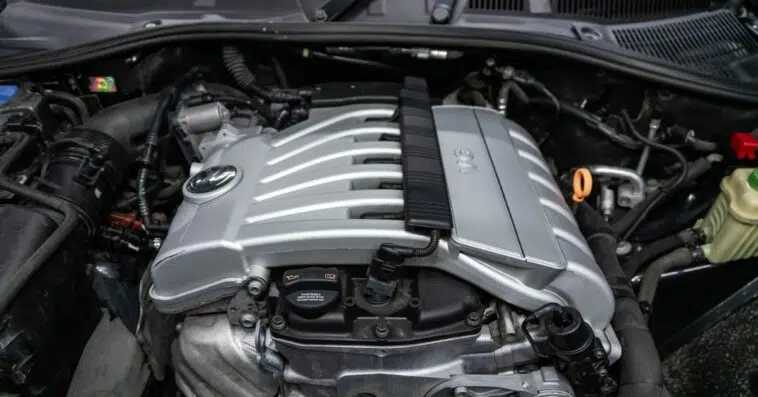The Volkswagen and Audi 3.0 TDI engine problems are not out of this world. Usually, engines are known to become weak when they travel certain miles, regardless of the maintenance you provide.
Volkswagen/Audi 3.0 TDI engines have common problems such as:
- Fuel Injector Problem
- Faulty Timing Chains Tensioner
- HPFP Problem
Like I said earlier, problems vary in engines. While these common problems are associated with Volkswagen/Audi 3.0 TDI engines, it doesn’t mean the engine isn’t one of the best. With adequate and timely maintenance, you can extend the engine’s lifespan.
All engines have a common problem, however, these problems vary from engine to engine, including the most talked-about Volkswagen/Audi 3.0 TDI engine.
In this article, I will explain the common problems of this engine, the symptoms to note, and the solution to each of the common problems.
TABLE OF CONTENTS
What Are The Most Common Volkswagen/Audi 3.0 TDI Engine Issues?
1. Fuel Injector Problem
An engine needs fuel for its effectiveness. Fuel injector in Volkswagen/Audi 3.0 TDI engines is responsible for circulating or spraying fuel into every crucial part.
However, it uses valves, which are electronically controlled and can open and close as many times as possible within a second.
The injector has an atomizing nozzle that helps to circulate diesel properly for the engine to work at its best and optimum combustion.
The 3.0 diesel engines run on a fueling system known as common rail direct injection. This means the engine’s cylinder, instead of intake ports, receives the fuel sprayed by the fuel injector.
Engines that run on DI as seen in many Audis, are prone to fuel injector problems as time goes on due to the engine’s condition.
Engines running on diesel require fuel for pumping at a high temperature, being the primary reason they require a fuel pump that has high pressure. Due to the constant engagement of the injector to continuously exhibit its duty, it can fail over time.
Two things are likely to happen when the injector fails. First, injector clogging may happen, leading to its failure. Secondly, it may leak, shortening the amount of fuel to deliver to the cylinders.
Proper maintenance may see you replace this part once or twice. This may, however, depend on the engine’s lifespan.
What Causes Fuel Injector Failure
1. Carbon Build-Up
Once you notice that the fuel injector is having a lot of issues, there is a sign that there’s a carbon build-up.
Since the fuel injector is essentially designed to take fuel to where it’s needed, it can be clogged by any form of deposit or debris.
Once the carbon deposit stands in the way of the fuel, fuel circulation becomes difficult; and if fuel cannot move, the destruction of the injector is imminent.
2. Dry, Broken Rubber Seals
Broken or dry rubber seals can cause the fuel injector to malfunction. The seals are expected to be intact and wet. But once it becomes dry and damaged, it causes the fuel injector to damage, causing a leak.
3. Internal Crack In The Injector
External or internal crack in the injector portends great danger for the fuel injector.
If it cracks, the consequence is a fuel leak, and once fuel does not get to the engine, the components part will damage. The injector leaks due to cracks in the injector nozzle or body.
What Symptoms To Look Out For
You may not have an idea you are about to have a problematic fuel injector if I don’t talk about the symptoms.
Let’s briefly take a look at that.
- Power Loss: You cannot expect to have your engine functioning at its best since fuel will not be going to the right channel. Shortage of fuel in the injector will reduce the engine’s power.
- Fuel Leak: Fuel dripping from the engine may signal a failing fuel injector. Since it is subjected to abuse from the engine, it can deteriorate anytime which will cause it to leak.
- Rough Idle: Both air and fuel can get injected by the injectors into the cylinder. A clogged injector will prevent it from providing the required mixture of air and fuel. When this happens, the engine will accelerate slowly or rough idle.
What Fix To Apply
If you want to solve the injector problem in a 3.0 diesel engine, you may find it difficult if you don’t know how to trace your way around the engine.
The fuel injector is one of the powerhouses of the engine and you should know already that replacing this part will not be cheap.
Replacing the injector will cost around $1000 to $1500. I, however, recommend that you buy an OEM injector to avoid replacing it again soon.
2. Timing Chain Tensioner Failure
The 3.0 diesel engine is one to developing this problem as complained by many users. You can find the timing chain tensioner below the timing chain cover on the engine’s front.
It plays an important role in the functionality of a car because it connects the crankshaft to the camshaft.
The tensioner is responsible for keeping the required tension on the chain. Failure of the tensioner will see the chain not kept in place.
All 3.0 diesel engines are produced with four timing chains and two tensioners. A failure of either of these two tensioners, as I explained, will result in engine-off.
Once this happens, it can cause a collision of pistons and valves, resulting in a serious Volkswagen/Audi 3.0 TDI Engine Problem. It is not a usual thing for a timing chain to fail but the tensioner is always responsible for its failure.
What Causes Timing Chain Tensioner Failure
1. Internal Crack In The Injector
External or internal crack in the injector portends great danger for the fuel injector.
If it cracks, the consequence is a fuel leak, and once fuel does not get to the engine, the components part will damage. The injector leaks due to cracks in the injector nozzle or body.
2. Internal Component Wear
Internal wear of the timing chain parts, including the chain tensioner and guide, can lead to the timing chain failing. This is due to age and mileage.
3. Bad Timing Chain Guides
Timing guides help to ensure the timing chain doesn’t derail from the right track. As the chain goes about synchronizing the rotation of the camshaft and crankshaft.
This way, the chain can get the proper timing and reinforce the engine valve to open and close at the right time.
4. Oil Pressure Leaks
Low oil levels and oil pressure leaks are two interconnected causes of timing chain tensioner failure.
Once the oil level drops, the timing chain tensioner won’t perform its job well. This is because the oil is supposed to lubricate the moving parts of the chain for smooth circulation.
5. Timing Chain Stretches
As the timing chain ages, it wears faster, causing it to stretch beyond its tensile strength.
This often occurs when you overload the chain tensioner and it works beyond its loading capacity. Check the loading capacity of the tension to know how much load it’s supposed to carry.
What Symptoms To Look Out For
Now that we are familiar with the function of the timing chain, let’s briefly discuss its symptoms to watch out for if it’s failing.
- Engine Runs Poorly: Over time, the timing chain can stretch, resulting in the chain skipping a gear on either crankshaft or cam. Once this happens, the engine’s timing will not calibrate, causing the engine to run poorly.
- Failed Ignition Or Start: You may experience difficulties in starting your engine or the engine may trip off while in motion. A faulty timing chain will not produce enough compression to start.
- Rattling Sound: Any kind of sound usually indicates a problem with engines. However, rattling sound signals a failing timing chain as a result of vibration produced in the engine. Other symptoms may include engine stalling, hesitation, rough idle, or check engine light on.
What Fix To Apply
Timing chains and tensioners can be a rigorous exercise to replace regardless of the experience level of your DIY.
You may need to budget about $2,000-$3,000 if you will be considering a repair shop. Replacing the tensioners and timing chain may not require bringing the engine out if you know how to go about it.
3. HPFP Problem
The High-Pressure Fuel Pump (HPFP) problem is one of the most annoying Volkswagen/Audi 3.0 TDI engine issues you would never want to run into. HPFP is responsible for distributing fuel into the injectors for full and effective functionality.
A failing HPFP will cause it to distribute iron filings or fragments through the fuel system. When this happens, the engine may be closer to ending its lifespan, if you do not act immediately.
Pumping of metal fragments will require you to replace all the parts that are connected to the fueling system. Don’t worry too much about the gas tank.
Pump failure can happen when the valve above the pump fails. On the other hand, if a strange object or anything in the HFPF forces itself through the fuelling system, it will result in pump failure.
The chances of having a faulty HPFP may be small when you consider certain preventive measures such as the use of quality oil, diesel, or by maintaining your engine regularly.
What Causes HPFP Failure
While there’s no cocksure reason why a high-pressure fuel pump could fail in Volkswagen/Audi 3.0 TDI engine, some experts have suggested that poor operating conditions could trigger the problem.
1. Excessive Heat
Excessive heat is the main cause of a high-pressure fuel pump. Once it is overheated, the pump will break or damage, leading to a lack of fuel circulation.
Always check that the engine is operating under favorable conditions and environment to avoid overheating.
2. Solenoid Failure
Solenoid failure can cause the HFPF to fail. During fuel pumping, the valve is expected to open and close; but once it is not opening, it’s difficult for the HPFP to do its job as it should.
3. Lack Of Oil Change
If you leave the engine oil for a long time without replacing it, you’re likely to see the HFPF fail. Make sure you replace the oil at a normal interval.
Normally, to get the most out of the HFPF and other components, it is recommended to change the oil every 3000 miles.
Some advice changing the oil every 5,000 or 7,500 miles. Sometimes, these things boil down to the quality of oil you’re using.
4. Injector Pump Leak
It’s a no-brainer to link the leaking injector pump to a failing high-pressure fuel pump.
The HFPF sends fuel to the injector pump which in turn sends fuel to the engine for proper functioning. The failure of the fuel injector leads to the HFPF failure.
Some have suggested that the HPFP failure may be due to design flaws by the engine’s manufacturers.
There is no sufficient reason to put HPFP failure on the doorstep of the manufacturer as users’ experience over time doesn’t support the claim.
What Symptoms To Look Out For
HPFP can be expensive to replace, therefore, let me briefly discuss the symptoms to watch out for to help you avoid outrageous expenses.
- Stalling: Failing HPFP will sometimes cause your engine to stall since metal fragments may prevent oil from circulating to the right channel
- Start Problem: It will be difficult to start an engine with an HPFP problem since oil will not be distributed to where it is needed. Other symptoms may include overheating and a low fuel pressure reading.
- Gas Flow Restriction: Another sign you are likely to see if your Audi 3.0 TDI is running on a failing HPFP system is limited flow of gas to the engine block. Once the high-pressure fuel pump gets bad, the engine block will stop receiving enough gas. This gas starvation will cause the engine to malfunction and eventually damage if not quickly fixed.
- Other Symptoms: Include limp mode activation, difficulty in starting your car, and illuminating check engine light.
What Fix To Apply
No one would want to run into this problem as it is very expensive to fix. If you are not covered by VW/Audi’s warranty, you may be on your way to losing part of your savings to get your engine on the road again.
Since replacing this part requires bringing out some parts to access it, you can trust it’s a daunting task. A budget in the range of $10,000 and $40,000 should take care of your needs.
FAQs
1. How Reliable Is The Volkswagen/Audi 3.0 TDI Engine?
The Audi 3.0 engine is reliable if you provide regular maintenance. It tows pretty well.
However, many owners and drivers of the Volkswagen Audi 3.0 have complained that they are not able to drive the engine past the 100,000-mile mark without having to repair or replace one component or another.
But I think the reason might be the operations conditions and environment of the vehicle. On average, the vehicle can make it up to 150,000 miles before it starts to have issues.
If you’re faithful to the maintenance schedule, it can last much longer, even up to 200,000 miles. However, it may not reach this mile mark if there is no deliberate attempt to service or maintain it.
2. What Are The Specifications Of The 3.0 TDI Engines?
| Features: | Specs: |
| Power, hp | 204-245 hp /3,500-4,500 |
| Torque LB-FT | 332-406 lb-ft/1,400 |
| Fuel system | Common rail direct injection |
| Type of internal combustion engine | Four-stroke, turbocharged |
| Position of cylinders | V-engine |
| Valvetrain layout | DOHC |
3. Can I Drive With A Bad Chain Tensioner?
The direct answer to your question is No. It is both unsafe and uneconomical driving if your chain tensioner has gone bad.
By design, the tensioner is intended to ensure those car accessories that run on and are powered by tensions receive as much as they can get.
So, any wear around and on the belt tensioner can lead to a slip. The more dangerous aspect of driving with a faulty chain tensioner is that the heat generated along the accessory pulleys becomes quite unsafe and so creates so much noise.
Overall, if you drive for too long with a defective chain, you’ll be putting extreme strain on the chain, causing it to stretch beyond its elastic limit.
Consequently, the chain can jump a few teeth, fail, and so cause serious damage to the internal part of the engine.
Final Thoughts
Different factors may contribute to the quick aging of a car engine, such as improper maintenance or engine age.
Whatever the cause may be, the most important thing is to replace faulty parts as quickly as possible.
However, replacing these engine parts can still lead to another Volkswagen Audi 3.0 TDI engine problems, should you opt for after-market parts.
After-market parts can suddenly shut down your engine if you use them, except if you are certain of their quality.
On the other hand, opting for OEM parts for the replacement of damaged parts in your Audi 3.0 diesel engine is always best because it offers quality that will help extend engine life.
Although OEM parts are healthy for your engine, you should, however, regularly maintain your car and avoid after-market parts.
However, if you want aftermarket parts, you can contact the manufacturer; they have the best replacement products that can withstand pressure.




